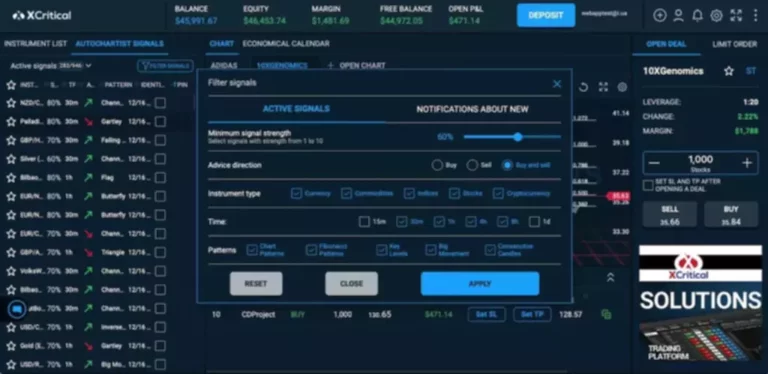Content
Whether you have a lot or little to spare, there’s always an option to earn a passive income on your crypto coins. By participating in delegation, Ledger owners can contribute to the security and decentralization of the Ledger network. The more Ledger owners that delegate to different validators, the greater the network’s security and resistance to centralization become. Validation is a crucial component of the Ledger network’s staking ecosystem. It plays a vital role in ensuring the security, integrity, and reliability of the network. In this article, we https://www.xcritical.com/ will dive into the significance of validation and its impact on the Ledger network.
Overview of rewards earned through Ledger staking
- It is important to familiarize yourself with the unstaking process before staking your tokens.
- This helps the validator node by increasing its chances of being selected by the network to perform work.
- It’s important to check which cryptocurrencies are supported by Ledger for staking before engaging in the process.
- Ledger delegation is a process that allows Ledger owners to delegate their staking power to a validator of their choice on the Ledger network.
- Staking is a process of participating in the validation of transactions on a blockchain network.
- Finally, Ledger Live prompts you to finalise the transaction on your device after selecting your desired staking service provider.
- Some networks distribute rewards on a daily or weekly basis, while others may have longer intervals.
Nor can we afford to operate a best proof of stake coins system 24×7 with such high processing power or understand the technicalities of the process. You can participate in the network and get rewarded for it in a few clicks. Blockchain networks are constantly evolving, and updates can have an impact on the staking process and rewards distribution. Stay informed about network upgrades, protocol changes, and other relevant updates to ensure you are maximizing your staking rewards.
Staking Crypto: Your Options in Ledger Live
These rewards are distributed based on the amount of stake delegated and the validator’s performance. Users can track their rewards and monitor their delegation status through the staking app on their Ledger device. Stacks blockchain uses a proof-of-stake consensus mechanism, which allows Proof of stake holders of STX to earn rewards for participating in the network by holding and staking their coins. To support the security and consensus of the Stacks network, you can stake and lock your Stacks tokens, the native currency of the network.
How to stake with Ledger Hardware wallet?

Grow your assets while securely holding them with your Ledger hardware wallet. Furthermore, users can utilize Ledger’s staking interface, which provides detailed information about available validators, their performance, and historical data. This allows users to monitor the performance of validators and adjust their delegation as necessary. It’s important to note that staking also carries some risks, such as the possibility of slashing, which is the penalty for malicious behavior. However, proper research and choosing reputable validators can help mitigate these risks. Keep full custody of your assets when you stake Stacks with the Hiro wallet, unlike with crypto exchanges.

If a coin is especially volatile, you may be putting yourself at risk when locking it up. By the time you unstake your funds, they may not be worth as much as you’d hoped—even with the rewards on top. To combat this issue of liquidity, there are now innovative staking methods including liquid staking—wherein you receive usable tokens in return for your stake. Earn section allows you to stake assets, track rewards, and discover earning opportunities across chains without navigating multiple platforms and interfaces. In the Earn section, you can easily see all your staked and eligible for staking assets, APR/APY, and earned rewards. By exploring different delegation options, Ledger staking users can find validators that align with their specific needs and preferences.

As a result, you can earn Bitcoin as a reward, which is transferred to you by miners through Proof of Transfer mining. If you are new to crypto or prefer a straightforward option, you can stake your Stacks in a non-custodial pool. These services combine your Stacks with others and pay out your rewards at the end of each cycle. In return for their efforts, computing power, and resources, the network rewards a validator in its native cryptocurrency.
It earned about 9% annually and I received a small interest rewards payment every Monday. Yes, the Ledger wallet supports direct staking from the hardware wallet. Every block in the network contains different transactions, which must be validated.
You can move away from staking your digital assets on crypto exchanges, like Binance, Nexo, or Kraken, and use a hardware crypto wallet instead, known as cold staking. There are more and more (cold) hardware wallets on the market, so you have plenty of different options. The locked-up funds act as collateral, proving the nodes will act with integrity when verifying transactions. That’s because the network automatically punishes bad actors by slashing their rewards. Plus, the network favors validators with a higher amount of staked currency. That’s because the more collateral a node has, the higher the chance it will act legitimately.
Staking is the process of participating in the validation of transactions and production of blocks on a blockchain network. By staking their cryptocurrency, users contribute to the security and operation of the network, and in return, they receive rewards. By following these steps, you can start staking your assets with Ledger and earn rewards through delegation and validation on supported blockchain networks.
For more information on liquid staking in Lido, make sure to check out the support documentation here. Ledger Live has multiple options available that let you start earning cryptocurrencies right away. Well, you can, and you can even do it from within the security of the Ledger Ecosystem. With Ledger Live, you can earn crypto rewards by staking multiple coins with various different methods.
Since 2017, he has pivoted his career towards blockchain technology, with principal interest in applications of blockchain technology in politics, business and society. No, BTC is not a proof of stake coin and you can’t stake it at all, on any device. Ledger allows users to stake ADA through the use of a third-party wallet.
By participating in staking and validation, users can not only earn rewards but also contribute to the overall decentralization and security of the blockchain network. It also enables users to have a say in the governance and decision-making processes of the network. Delegation is a process where you allocate your tokens to a trusted third party, also known as a validator, to perform the staking process on your behalf. Ledger provides a secure and user-friendly way to delegate your tokens, ensuring that your funds are protected while still earning rewards. Like any form of investment or participation in blockchain networks, staking with Ledger carries certain risks. By participating in staking and delegation, users can earn rewards for their contribution to the network.
Not only that, its approach is widely followed in the industry. Furthermore, Kiln’s on-chain product led them to become the founding technology provider behind the first institutional liquid staking standard, Liquid Collective. There are two distinct ways to do this and they have key differences in terms of the rewards you’ll earn, as well as the transparency of the process as a whole.
They can compare reward structures, fees, security measures, and transparency to make an informed decision. When a participant delegates their tokens, they still earn a portion of the rewards generated by the validator they have delegated to. The amount of rewards earned through delegation depends on the total amount of tokens delegated to a particular validator and their performance in the network.

